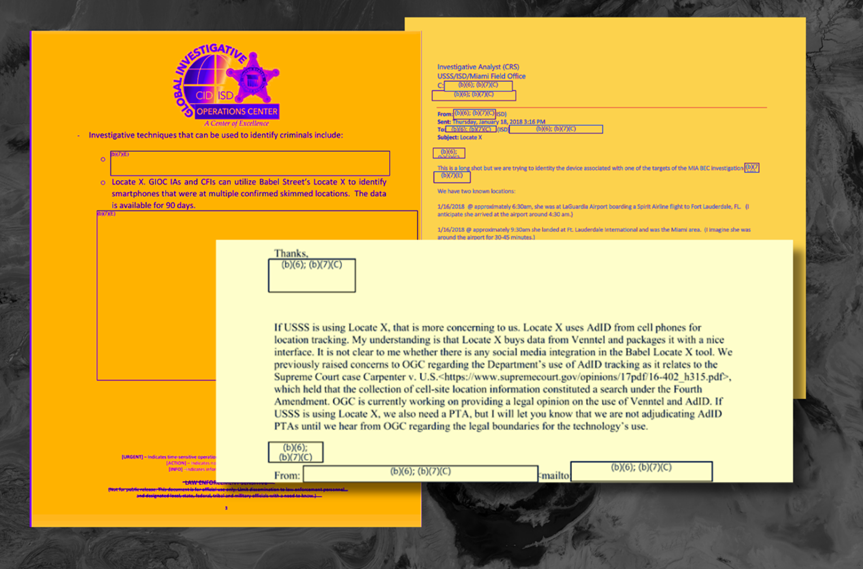Man
Professional
- Messages
- 3,222
- Reaction score
- 1,199
- Points
- 113
The US Secret Service is at the center of a scandal with the illegal collection of data of millions of citizens.
U.S. Secret Service officials have entered into a dispute over whether a warrant is needed to access location data that is collected through conventional smartphone apps. According to internal correspondence obtained by 404 Media, some representatives of the service claimed that people themselves agree to tracking when they accept the terms of use of the applications. However, users often do not even know that the data can get to the authorities.
The leaked correspondence revealed details of the U.S. Secret Service's (USSS) use of a tool called Locate X, which allows you to track a person's movements using their phone. In 2023, an audit found that the Secret Service, Customs and Immigration had illegally used access to such data. In response to a request from journalists, representatives of the Secret Service said that this tool is no longer used.

An example of correspondence between USSS employees (404 Media)
Locate X is developed by Babel Street and collects data on people's movements through apps on iOS and Android devices. Apps feed the information to data brokers, and then it goes into systems like Locate X. Earlier, reporters found that the tool could track the movements of people, such as those who visited certain clinics, all the way back to where they lived.
Information about the use of Locate X first appeared in 2020 thanks to the publication of Protocol. It was found that the USSS and other agencies used the program to track fraudsters, such as those who steal data from bank cards. One of the documents said that the tool helps identify phones that were located in places where cases of skimming were recorded.
However, there was disagreement within the Secret Service over the legality of using the data without a warrant. Some employees believed that the tool fell under the Supreme Court's decision in the Timothy Carpenter case, which found that access to cellular carrier data required a warrant. But Babel Street insisted that the company's tool does not violate the law, as the data is collected with the consent of users and is anonymized. However, a recent demonstration of Locate X showed that it is easy to identify a user by their phone's unique advertising ID.
The correspondence also discussed which Secret Service units used Locate X. For example, the Office of Strategic Investigations used the tool to search for phones at airports and during international investigations into cryptocurrency fraud.
Senator Ron Wyden has expressed concern that the government is buying location data without a warrant, circumventing the Fourth Amendment. Wyden said Congress needs to pass legislation that would set strict rules for the use of commercial data by government agencies. The Secret Service, in response to a request, confirmed that it operates in accordance with laws and policies, but no longer uses Locate X.
Source
U.S. Secret Service officials have entered into a dispute over whether a warrant is needed to access location data that is collected through conventional smartphone apps. According to internal correspondence obtained by 404 Media, some representatives of the service claimed that people themselves agree to tracking when they accept the terms of use of the applications. However, users often do not even know that the data can get to the authorities.
The leaked correspondence revealed details of the U.S. Secret Service's (USSS) use of a tool called Locate X, which allows you to track a person's movements using their phone. In 2023, an audit found that the Secret Service, Customs and Immigration had illegally used access to such data. In response to a request from journalists, representatives of the Secret Service said that this tool is no longer used.

An example of correspondence between USSS employees (404 Media)
Locate X is developed by Babel Street and collects data on people's movements through apps on iOS and Android devices. Apps feed the information to data brokers, and then it goes into systems like Locate X. Earlier, reporters found that the tool could track the movements of people, such as those who visited certain clinics, all the way back to where they lived.
Information about the use of Locate X first appeared in 2020 thanks to the publication of Protocol. It was found that the USSS and other agencies used the program to track fraudsters, such as those who steal data from bank cards. One of the documents said that the tool helps identify phones that were located in places where cases of skimming were recorded.
However, there was disagreement within the Secret Service over the legality of using the data without a warrant. Some employees believed that the tool fell under the Supreme Court's decision in the Timothy Carpenter case, which found that access to cellular carrier data required a warrant. But Babel Street insisted that the company's tool does not violate the law, as the data is collected with the consent of users and is anonymized. However, a recent demonstration of Locate X showed that it is easy to identify a user by their phone's unique advertising ID.
The correspondence also discussed which Secret Service units used Locate X. For example, the Office of Strategic Investigations used the tool to search for phones at airports and during international investigations into cryptocurrency fraud.
Senator Ron Wyden has expressed concern that the government is buying location data without a warrant, circumventing the Fourth Amendment. Wyden said Congress needs to pass legislation that would set strict rules for the use of commercial data by government agencies. The Secret Service, in response to a request, confirmed that it operates in accordance with laws and policies, but no longer uses Locate X.
Source

